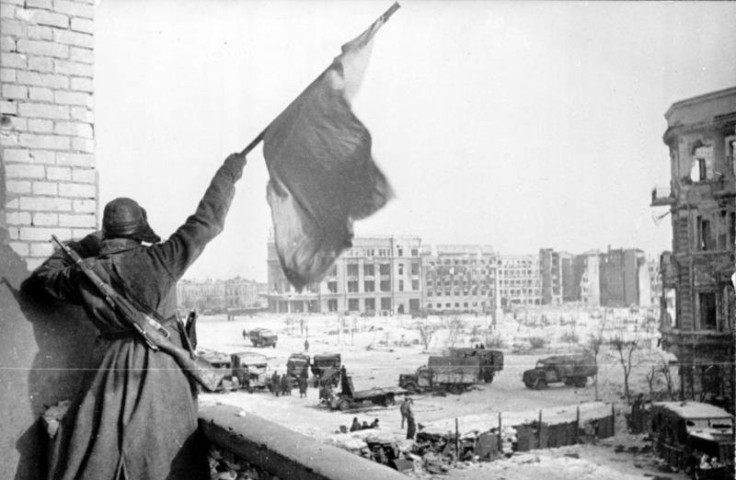Stalingrad: 70 Years After Decisive World War II Battle, Another War Over City’s Name

On the eve of the seventieth anniversary of the end of the Stalingrad siege -- the decisive turning point of World War II on the Eastern Front -- city officials in Volgograd have decided to temporarily revive the city’s old name as a demonstration of nationalistic and patriotic fervor.
The city has been called Volgograd since 1961 (when Moscow, led by Nikita Khrushchev, felt that revelations of Soviet dictator Joseph Stalin’s many crimes and atrocities would stain the reputation of this southern Russian city.
But now, on Saturday, to commemorate the famous siege and battle, in which at least 2 million people died and turned the tide of the war against Nazi Germany, the city will revive the controversial former name.
The Volgograd council, which is controlled by members of Vladimir Putin’s ruling United Russia party, claimed the request to temporarily rename the city came from veterans from World War II, who would now be in their 80s and 90s.
The BBC reported that some critics allege that the measure is merely designed to raise United Russia’s profile and popularity ahead of September elections.
An opposition party member of the Volgograd council, Oleg Mikheyev, told the Gazeta.Ru news website: "The Volgograd-Stalingrad issue comes up before every election then drops back down when the election is over. I think Stalingrad is already bigger than Stalin; it's the name of the city of the great victory, but this issue should be settled finally in a referendum."
There are also concerns that Putin is seeking to rehabilitate Stalin’s image to create the impression that he was a great military leader rather than the man responsible for the deaths of millions of people within Russia itself.
To put it mildly, Stalin remains an extremely polarizing figure in modern Russia.
Nikolai Levichev, a federal MP of the Just Russia Party, told the Interfax news agency that it would be "blasphemous to rename the great Russian city after a bloody tyrant who had killed millions of his fellow citizens and caused irreparable damage to the nation's gene pool.”
Vladimir Lukin, Russia's human rights ombudsman, also bitterly complained to Interfax: "This is an insult of the memory of those who died [in the siege].”
The city council of Volgograd has actually restored the old name for six days every year -- on dates that coincide with important military commemorations: Feb. 2 (marking Stalingrad's victory over the Nazis), May 9 (which celebrates victory over Nazi Germany), June 22 (a "day of sorrow" marking Germany’s invasion of Russia in 1941 during Operation Barbarossa), Aug. 23 (marking the deaths of civilians killed by German airplanes at the start of the Stalingrad siege), Sept. 2 (marking victory over Japan in World War II) and Nov. 19 (marking the preparation of artillery in the ultimately successful counteroffensive at Stalingrad).
But local communists claim they have 35,000 signatures on a petition to permanently change the city's name back to Stalingrad and may take this issue to court.
The city had been known for centuries as Tsaritsyn until it was renamed in 1925 to honor Stalin for his efforts at leading the Bolsheviks against the White Russians during the Russian civil war between 1918 and 1920.
The Battle of Stalingrad, which lasted six months between August 1942 and February 1943, is regarded not only as the beginning of the end of the Nazi war machine, but one of the bloodiest conflicts in human history. While many soldiers and civilians died in close-quarter combat, many others perished from starvation, disease and especially from the cold of the long Russian winter.
In the wake of sustaining heavy losses, the German army was depleted and could gain no further strategic victories on the vast Eastern front.
Ironically, since the name of the city during the bloody 1942-1943 sieges was Stalingrad, that appellation is permanently inseparable from the city’s history, even if it is now officially called Volgograd.
Such name changes (and restorations) are hardly unprecedented.
The city of St. Petersburg, founded by Tsar Peter the Great in 1703, was redubbed Leningrad in 1924 in honor of Vladimir Lenin, who had just died.
By 1991, after the fall of communism, the old Tsarist name was restored.
© Copyright IBTimes 2024. All rights reserved.





















